Project List
Projects
To learn more about the projects IPI has worked on this month please select the tabs in this section.
Project Spotlight: Digital Access for All Idahoans Planning Support
Matthew May, Ben Larsen, Cheong Kim, Kyle Peterson, Lantz McGinnis-Brown, Kellen McGurkin
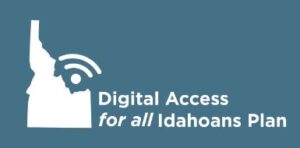
Many Idahoans face barriers to digital access at a time when internet use is increasingly vital to the ability to thrive in every aspect of life like access to health care, education, business, and government services. The Digital Access for All Idahoans (DAAI) plan documents pervasive barriers to digital access and proposes a visionary strategy to end digital access divides that prevent many Idahoans from accessing crucial technology. The DAAI plan will increase broadband affordability for Idahoans, as well as improve digital skills, cybersecurity awareness, access to devices, technical support, and access to public services.
Some Idahoans must surmount especially steep barriers to digital access due to membership in groups that have traditionally been excluded from the benefits of technological advances. The DAAI plan includes specific populations that are covered by the Digital Equity Act of 2021 and considers the unique barriers and solutions for each covered population. The DAAI covered populations are households below 150% of poverty level, aging individuals, incarcerated individuals, veterans, individuals with disabilities, individuals with a language barrier, individuals who are members of a racial or ethnic minority group, and individuals who primarily reside in a rural area.
Strategy and Objectives
The DAAI plan establishes goals and objectives to improve digital access for Idahoans, particularly Idahoans that are members of covered populations. The goals are relevant to barriers to digital access identified during the development of the DAAI plan. The DAAI plan includes specific objectives with measurable metrics that include baseline metrics to evaluate the plan’s success. The implementation of each goal is set to a specified timeline. Each of the following goals are necessary for increasing digital equity in Idaho and will be equally prioritized during the DAAI plan’s implementation. The DAAI goals and objectives include:
- Goal 1: Increase adoption and affordability of broadband technology
- Goal 2: Improve online accessibility and inclusivity of public resources and services
- Goal 3: Increase digital skills
- Goal 4: Spread awareness of cybersecurity and online privacy
- Goal 5: Increase availability and affordability of devices and technical support
Idaho digital asset inventory and needs assessment

The DAAI plan includes an asset inventory document of current resources that address barriers to digital inclusion in Idaho. This report includes assets serving each covered population. In addition, there are assets meant to increase broadband adoption and affordability listed in the plan. A needs assessment was conducted to identify barriers to digital access faced by covered populations. Evidence revealed many ways in which covered populations are at a disadvantage in digital access. Idaho ranks 40th in the nation on internet coverage, speed, and availability, while many Idaho households struggle to afford their monthly internet bill. The DAAI plan’s goals and objectives were developed to address the barriers to digital access identified in the needs assessment. The plan can be accessed at: Idaho Commission for Libraries: Digital Access for All Idahoans
Project Updates
SHIBA Program Effectiveness Study
Ben Larsen, Cheong Kim, Emily Pape

The Idaho Department of Insurance has partnered with IPI to conduct an analysis of the Idaho Senior Health Insurance Benefits Advisors (SHIBA) program, research approaches to State Health Insurance Assistance Programs (SHIPs) in other states, and report findings for consideration by the Idaho Department of Insurance (DOI) to improve the effectiveness of the SHIBA program. The project will analyze the effectiveness of four components of the SHIBA program: community partnerships, volunteer management, marketing and outreach, and operational procedures.
In October, data collection continued in the form of surveys and interviews. Two surveys were distributed, one to SHIBA Medicare counselors and volunteers and the other to past SHIBA beneficiaries. Interviews were conducted with SHIP staff in other states, SHIBA staff in Idaho, and community partner organizations.
HUD Eviction Protection Grant Program
Ben Larsen, Lantz McGinnis-Brown, McAllister Hall, Vanessa Fry
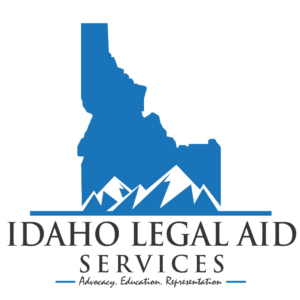
IPI does data management for the HUD Eviction Protection Grant Program in partnership with Idaho Legal Aid Services and other partners across Idaho, Montana, and Utah. The program provides low-income households with free eviction legal services and representation.
This month, all programmatic data for Quarter 1 was processed and submitted to HUD. In total, 277 households across Idaho, Montana, and Utah received legal services through the program.
Student Involvement
Idaho Office of Emergency Management
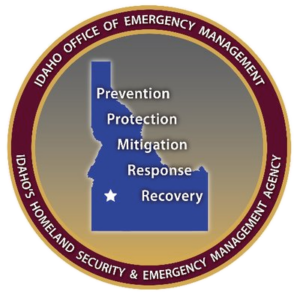
In October, IPI’s Fall 2023 intern, Patty Chelini, and manager of student engagement, McAllister Hall, started working on a project for the Idaho Office of Emergency Management (IOEM). IOEM is making efforts to increase the capacity for counties in Idaho to shelter populations in the event of an emergency. IPI is helping by making an inventory of current emergency shelter plans across the state. Information will be collected to make a map and identify gaps across the state.
Month in Review
IPI Director presents at annual AUBER Conference
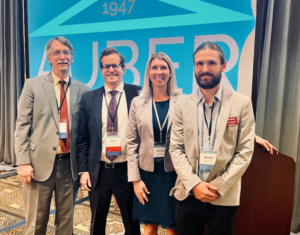
Idaho Policy Institute Director, Dr. Vanessa Fry, participated on a panel discussion, State Approaches to Housing Affordability, at the 2023 Association for Business and Economic Research (AUBER) Fall Conference in San Antonio, TX. AUBER is a professional organization for economic research centers at leading universities and affiliate organizations across America. The membership provides communities in nearly every state with meaningful economic policy research and data that promotes informed decision-making and strengthens business environments. Dr. Fry’s talk, The Economic Impact of Housing First in Boise, discussed the success of New Path Community Housing, Idahos’ first Housing First project. In its first four years of operations, New Path has resulted in nearly $7 million in cost savings and avoidance.
IPI Research Associate presents at annual AUBER Conference
Idaho Policy Institute Research Associate, McAllister Hall, participated on a panel discussion, Workforce Skills and Education, at the 2023 Association for Business and Economic Research (AUBER) Fall Conference in San Antonio, TX. AUBER is a professional organization for economic research centers at leading universities and affiliate organizations across America. McAllister’s talk, Rural Idaho Dairy Industry Workforce Needs, discussed how higher education institutions can help fill the gap of current and future workforce needs in the dairy industry.
IPI research scholar facilitates workshop at the 2023 Idaho Summit on Hunger and Food Security
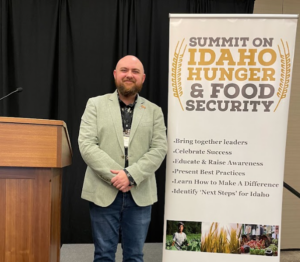
On October 12, 2023, Ben Larsen helped facilitate a breakout session at the 2023 Idaho Summit on Hunger and Food Security hosted by the Idaho Hunger Relief Task Force. Ben joined the planning committee for the event and also helped facilitate and analyze a stakeholder survey about research priorities surrounding hunger and food security in Idaho. During the workshop, Ben led groups of participants through guided activities meant to plan the future research agenda of the Idaho Hunger Relief Task Force.
IPI Research Scholar interviewed on Idaho Matters
Idaho Policy Institute Research Scholar, Matthew May, was a guest on the Boise State Public Radio program Idaho Matters on October 16th. Discussion centered around Idaho’s primary system, proposed reforms and their tradeoffs, and previewed the panel discussion to be held at the College of Idaho’s 2023 Idaho Policy Forum later in the month.
IPI Research Scholar participates in 2023 Idaho Policy Forum panel on Open Primaries
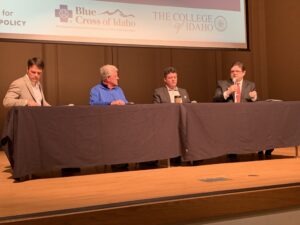
Idaho Policy Institute Research Scholar, Matthew May, participated in a panel discussion on open primaries at the College of Idaho’s 2023 Idaho Policy Forum on October 25th. May provided information on the tradeoffs between primary system types and Idaho’s history with the direct primary. The panel was moderated by Boise City Council member Patrick Bageant and also included former Idaho Governor Butch Otter and Reclaim Idaho founder Luke Mayville.
Current Staff List
-
Director
Associate Research Faculty
Vanessa Fry, Ph.D.
Vanessa Fry, Ph.D.
-
Research Scholars
Cheong Kim, Ph.D.
Ben Larsen, Ph.D.
Matthew May, Ph.D.Cheong Kim, Ph.D.
Ben Larsen, Ph.D.
Matthew May, Ph.D. -
Research Associates
McAllister Hall, MA
Lantz McGinnis-Brown, MPA
Emily Pape, MPPMcAllister Hall, MA
Lantz McGinnis-Brown, MPA
Emily Pape, MPP -
Management Assistant
Valerie Hayes
Valerie Hayes
-
Research Administrator
Britney Whiting-Looze
Britney Whiting-Looze
-
Graduate Research Assistant
Elijah Kuisachor
Elijah Kuisachor
-
Intern
Patty Chelini
Patty Chelini
-
Work-Study
Eliza Chaffin
Eliza Chaffin